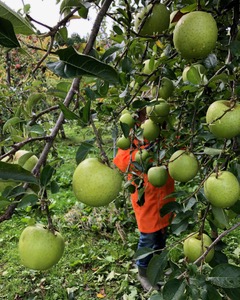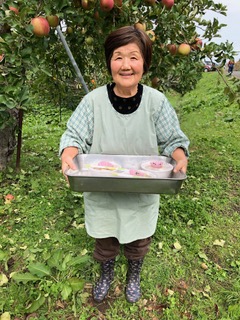A Day on a Farm
- At October 20, 2019
- By admin
- In Annes Letters
 0
0
Dear Family and Friends,
Japanese fruits are renowned for their quality, taste, and sheer beauty. Grapes are huge, juicy, and round. Strawberries are lush and vibrantly red. Peaches are perfectly shaped and sweet. And apples come in many varieties and sizes, all year round.
My friend Noriko knows a farmer who needs help on his apple farm at this time of year. Noriko loves rural Japan, just as I do, so she readily offered her services. Would I like to join her? Of course.

As you know, last weekend Hagibis marched her relentless way through our lives, followed by more torrential rain, with still more to come this week. But this weekend offered a hiatus of sunshine and warm weather. “We have to do this work now between the storms,” the farmer explained. “Come quickly.”
I had thought we were going to pick apples. But I was mistaken. Fuji and certain green apples will be ready later in the season. Our job today was to make conditions just right for these gorgeous balls of tart wonder to reach their perfect peak. We had to clip back leaves near each apple, then turn the fruit slightly so that sunshine could directly hit the side that had not been exposed. In other words, we were to work our way from apple to apple, tree to tree, cutting off leaves, making sure not to pierce the fruit or to cut the tip of branches, which were wombs for next year’s produce.

Each apple was treated with the greatest of reverence and care. Everything was hand done. No machines, only very sharp clippers and ladders.

There were only four of us working today. Besides Noriko and me, there were two elderly gentlemen who did farm work as a way to supplement their meager pensions. At first, they were shy and barely talked, but later they warmed up to us and chatted a bit. But not much. Rural Japanese men are most often sturdy, quiet folk who work long and impressively hard.

In fact, much of today was spent in silence. But there were many reassuring sounds. The snip, snip of the clippers, the chatter of birds, the distant laughter of children at play, and the subtle hum of traffic on a nearby road. It was very peaceful and relaxing, even as we stretched to reach high branches, or bent low to pick up fallen tools.
Mama came just at noon with an unexpected lunch for us, delicious homemade soup.

Japanese fruits are renowned for their quality, taste, and sheer beauty. Grapes are huge, juicy, and round. Strawberries are lush and vibrantly red. Peaches are perfectly shaped and sweet. And apples come in many varieties and sizes, all year round.
My friend Noriko knows a farmer who needs help on his apple farm at this time of year. Noriko loves rural Japan, just as I do, so she readily offered her services. Would I like to join her? Of course.

As you know, last weekend Hagibis marched her relentless way through our lives, followed by more torrential rain, with still more to come this week. But this weekend offered a hiatus of sunshine and warm weather. “We have to do this work now between the storms,” the farmer explained. “Come quickly.”
I had thought we were going to pick apples. But I was mistaken. Fuji and certain green apples will be ready later in the season. Our job today was to make conditions just right for these gorgeous balls of tart wonder to reach their perfect peak. We had to clip back leaves near each apple, then turn the fruit slightly so that sunshine could directly hit the side that had not been exposed. In other words, we were to work our way from apple to apple, tree to tree, cutting off leaves, making sure not to pierce the fruit or to cut the tip of branches, which were wombs for next year’s produce.

Apples before our work
Each apple was treated with the greatest of reverence and care. Everything was hand done. No machines, only very sharp clippers and ladders.

Apples after our work
There were only four of us working today. Besides Noriko and me, there were two elderly gentlemen who did farm work as a way to supplement their meager pensions. At first, they were shy and barely talked, but later they warmed up to us and chatted a bit. But not much. Rural Japanese men are most often sturdy, quiet folk who work long and impressively hard.

In fact, much of today was spent in silence. But there were many reassuring sounds. The snip, snip of the clippers, the chatter of birds, the distant laughter of children at play, and the subtle hum of traffic on a nearby road. It was very peaceful and relaxing, even as we stretched to reach high branches, or bent low to pick up fallen tools.
Mama came just at noon with an unexpected lunch for us, delicious homemade soup.

After that and a rest, we headed back to the trees to continue the careful, mindful work that help make Fuji apples some of the best in the world.
Love,
Anne
Love,
Anne



